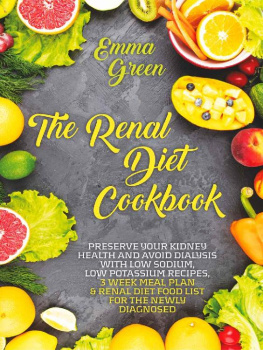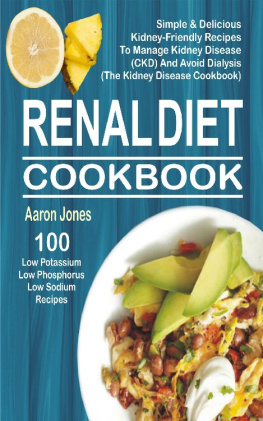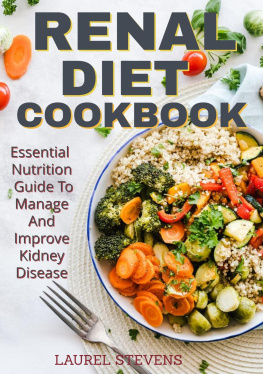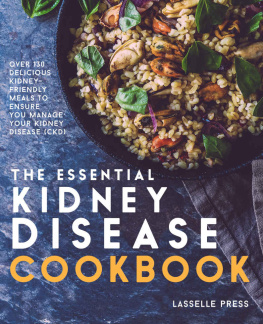Easy Renal Diet Cookbook Ultimate Guide To Manage Kidney Disease Laura Evans Copyright 2019 Laura Evans All rights reserved. No part of this publication may be reproduced, distributed, or transmitted in any form or by any means, including photocopying, recording, or other electronic or mechanical methods, without the prior written permission of the publisher, except in the case of brief quotations embodied in critical reviews and certain other noncommercial uses permitted by copyright law. Common Measuring units Apple Lemon Honey Smoothie Mixed Fruit mix Pineapple Colada Spicy Smoothie Healthy Lemon Blueberry Parfait Bouncing Smoothie Fresh Fruit Smoothie Laura Shake Cooked Meatballs And Sauce Chilled Pickles Cheesy Herbs Dip Crispy Pumpkin Seeds Turnip Greens With Kale Mashed Potatoes Cauliflower Flavorful Basmati Rice Quick Fajita Marinade
INTRODUCTION
By comparison, adults are 30 times more prone to develop kidney disease than children. About 27 million American adults suffer from Kidney disease and only one out of every 70,000 children- below the age of 20 experience kidney disease. The risk of having a kidney disease increases with age. Kidney disease is ranked among one of the leading cause of death in the United States, although a lot can be done to influence or control the progression of kidney disease at a very early stage.
When kidney disease is left untreated, a lot of damage can be done. The earlier you start attending to your kidney the better chance you have to effectively treat it. Following a kidney diet may delay total kidney failure and also bolster kidney function. Diet is a very important aspect of treatment for kidney disease and the impact can help you slow down the progression rate. People living with kidney disease must strictly stick to a kidney diet to reduce the amount of waste in their blood so that the kidney can function effectively. As a dietitian, with expert experience, I have worked with many kidney disease patients and other patient battling with different health issues.
I am sure you will find a lot of useful information in this book. My book has helped countless number of kidney disease patients to manage the physical symptoms and also deal with the emotional stress it can bring. At the very early stage of kidney disease, my advice to patients is to quickly make changes to their eating lifestyle. The Renal diet is one that is low in potassium, sodium and phosphorous. This book provides patients with information to have a better understanding of the function of the kidney, kidney failure, kidney diseases with diet information, such as dairy choice with low phosphorus, food low in sodium, fruit with low potassium and many more. This cookbook stresses the importance of consuming limited potassium, sodium, phosphorus and calcium with the right amount of protein.
Lets get started!
T he kidney organs are two in number, looking like the shaped of a bean, each about the size of a fist. They are located on either side of the spine, just below the rib cage.
Why Are the Kidneys So Important?
O ne of the kidney's major functions is the removal of excess fluid and waste from the body. These excess fluid and waste product are discharged through your urine. The urine production involves a high degree of complicated steps to discharged waste and re-absorption. These steps are crucial in maintaining a stable and balance body chemicals.
The kidneys also discharge acid produced by the body cells and retain a healthy balance of salts, water and mineralslike potassium, phosphorus, calcium and sodium in the blood. The hormone that the kidney produces also affects the role of other organs. The kidneys produce hormones that assist in the control of calcium metabolism and maintain blood pressure. It also produce hormone that stimulates red blood cell production and keep your bones healthy and strong. The kidneys consist of about a million filtering units called nephrons, and each of the nephrons contains "glomerulus". The glomerulus functions to filters the blood and the tube-shaped structure (tubule) give back needed substances to your blood and get rid of wastes.
The glomerulus filters any blood that enters it and the remaining liquid go through the tubule. A healthy functioning kidney filter up to half cup of blood per minute, removes excess water and the final product being the urine we pass out. The urine is transported from the kidney to the bladder through the ureters.
Function Of The Kidney
R egulate the manufacture of red blood cells Manufacture an create a form of vitamin D that boost strong and healthy bones Discharge hormones that regulate blood pressure Regulate the body's fluids Get rid of drugs from the body Get rid of waste products from the body
What is kidney disease?
A bout 27 million American adults suffer from Kidney disease. Kidney disease can be related to a situation when your kidney is damaged and can no longer carry out its function correctly. There are series of issues that can cause damage to the kidney, like high blood pressure, diabetes and series of other chronic conditions.
Living with a kidney disease can cause other related health problems- such as malnutrition, weak bones, nerve damage among others. When you have kidney disease over a period of time and it gets worse, your kidneys may stop functioning totally. What this translates to is you will require a dialysis to carry out the function of the kidneys. Dialysis is treatment procedure that filters toxins, excess water and solutes from the blood in people, whose kidneys can no longer carry out these functions naturally, using the help of a machine. Dialysis cannot cure kidney disease, but it can increase life span.
Types And Causes Of Kidney Disease
C hronic kidney disease This is the most common form of kidney disease.
Chronic kidney disease describes the gradual loss of kidney function over a long period of time. It is commonly caused by high blood pressure. High blood pressure poses a real danger to the kidney in a way that it elevates the pressure on the glomeruli. Glomeruli is responsible for cleaning the blood but with a constant increase in blood pressure, it destroys these vessels which cause a decline in kidney function. A kidney transplant may be another treatment option depending on your circumstances. Diabetes is another one of the many causes of chronic kidney disease.
Diabetes is a kind of disease that causes high blood sugar. The constant increase level of sugar in blood pressure destroys these vessels which cause a decline in kidney function of properly cleaning the blood vessels. The effect is the kidney becomes overloaded with toxic. Kidney stones Kidney stone is also a widely known kidney problem. This is a situation where some substance and other mineral properties in the blood obstruct the kidneys, forming solid masses (stones).During urination, kidney stones are usually being excreted, they cause severe pain in the abdomen, groin or flank and can lead to many other significant complications.
Next page














